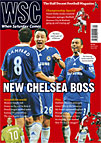 The Damned United proves Cloughie was perfect for the big screen, says Terry Staunton
The Damned United proves Cloughie was perfect for the big screen, says Terry Staunton
It’s not often that a film’s most noticeable, perhaps only, stumbling block is that its star is actually too good, but it’s arguably the case with Michael Sheen’s turn as Brian Clough in The Damned United. Sheen is, as we all know, the go-to guy du jour for screen portrayals of real people, his stock ever rising after taking on, in the last five years alone, Tony Blair (twice), Kenneth Williams and David Frost.
His Clough may well be the pick of the bunch, so precisely has he nailed the mannerisms, speech patterns, even the physicality of the man, but the actor’s own celebrity is now so established (he was made an OBE in the New Year’s honours list) that it threatens to eclipse any role he attempts. The fact that he’s made his mark playing other well-known celebrities, many of whom were household names in the 1970s, means it’s hard to shake the notion that we are, to all intents and purposes, watching a RADA-trained Mike Yarwood.
Sheen’s pinpoint characterisation will undoubtedly receive the lion’s share of plaudits, although director Tom Hooper deserves just as many hearty back-slaps for making something genuinely thrilling and evocative, which may well be the best film about football ever made. The period detail is spot-on, if a little cliched in places (gaudy beige wallpaper, walnuts in a bowl on a sideboard, oranges and ashtrays in the changing rooms) but Hooper never loses sight of the obsessions and single-mindedness that powered David Peace’s book about Clough’s tumultuous 44 days at Leeds United.
Two relationships drive the film. Clough’s rivalry with and rapidly vanishing respect for Don Revie, played by Colm Meaney, is chronicled through flashbacks starting at Derby County’s Baseball Ground in the late 1960s (filmed at Chesterfield’s suitably shoddy Saltergate). A curmudgeonly cat-and-mouse game with the men only coming face-to-face in a TV interview after Clough’s dismissal from Elland Road, younger viewers will draw comparisons with the Ferguson-Benítez clashes of late.
However, it’s Timothy Spall’s nuanced and tender Peter Taylor that frequently humanises the story, showing the assistant manager as a voice of reason and caution who spends most of the film keeping Clough’s “mad ambition” in check. The pair initially come across as excitable schoolboys (both are scolded for taking phone calls during mealtimes), and their falling out and subsequent reconciliation pushes as many emotional buttons as any more traditional movie love story. Not all supporting casting is as successful though, with the usually reliable Jim Broadbent making Derby chairman “Uncle” Sam Longson seem like a bumbling Carry On spiv, while John Savage’s non-speaking cameo as Gordon McQueen looks disturbingly like Blue Peter’s Lesley Judd.
Clough’s family and friends were less than happy with aspects of Peace’s book, and will be just as irked to discover that screenwriter Peter Morgan has chosen to repeat some inaccuracies, most notably showing the manager chain-smoking and swearing like a trooper. Morgan fabricated a late-night phone call between his two protagonists in Frost/Nixon, and he’s pulled the exact same trick here with a hurt and soon to be humiliated Clough calling Revie to complain about his treatment by the Leeds players.
Ultimately, they’re small concerns, as the story motors along with recourse to as many historical facts as can be shoehorned into 110 minutes. Derby’s ascent to champions is represented by on-screen graphics of league tables, while Clough the media manipulator is seen relishing press and TV interviews.
Discounting the savagery on the pitch, for which the Leeds team were notorious, football in the 1970s is often presented as more innocent and homely than it is today, but The Damned United shows arrogance and egos have always played their part in the rise and fall of teams and individuals. Clough was living proof of that, his “journey” (as movie execs might put it) perfect big screen material, and this telling doesn’t disappoint.
From WSC 266 April 2009